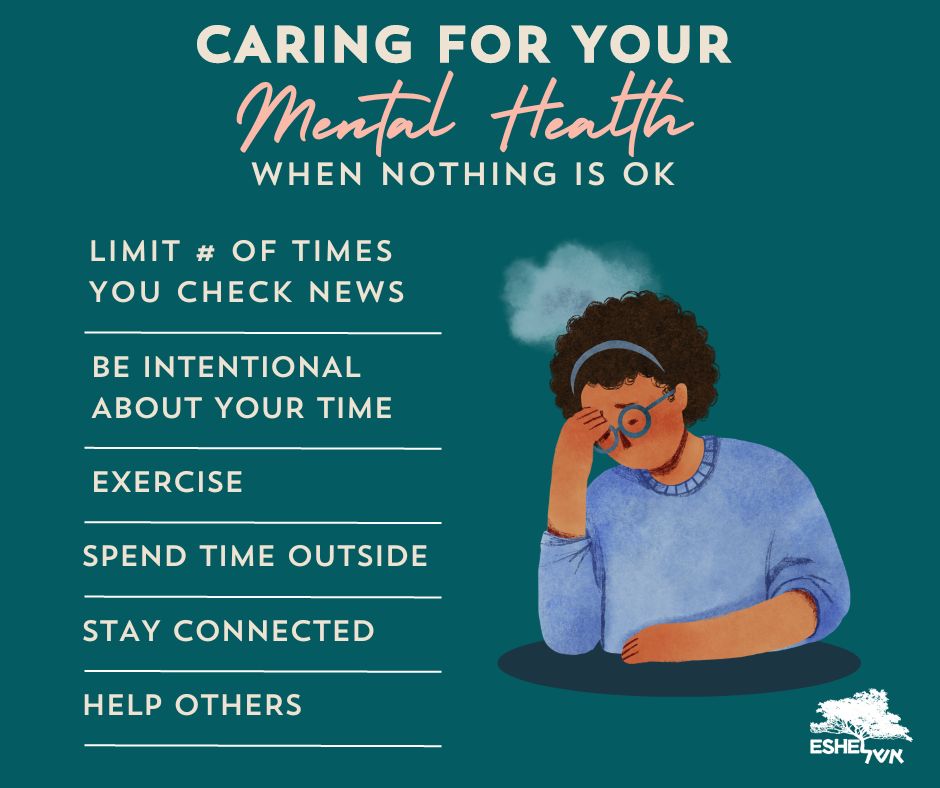
During the height of our joy celebrating the holidays of Shemini Atzeret and Simchat Torah, we were all crushed with unimaginable, nightmarish news coming from Israel. Particularly during tragedies of this magnitude, when we’re shaken to our core, the Jewish people feel like one big extended family, and the emotional impact is enormous.
Most of us know people who have been directly affected by the ongoing war, and even if not, it may feel like we do. We’ve probably all struggled with things like sleeping through the night and staying focused at work or school during the day. Some of us may have also seen horrific scenes on the news or social media. But as horrific as this situation is, and as much as we don’t want to think about ourselves at this time, we must make sure not to neglect our own mental health.
Without caring for ourselves, we risk falling into even worse states of emotional distress. We can be more helpful and supportive to Israel and our own families and communities by taking care of our mental health and wellbeing. Here are 6 simple suggestions for what we each can do to make sure we continue caring for ourselves throughout this time:
- Limit the amount of times you check the news.
We’ve all likely been following the news very closely – but the reality is that we would likely be just as informed if we watched or listened to the news just two or three times a day. Checking the news over and over again may give us a temporary feeling of control. However, excessive news-watching can contribute to a lack of focus and concentration as well as elevate stress and anxiety levels. - Be intentional about your time.
When setting aside specific times throughout the day to check the news, try to limit the amount of time you spend. One idea is to review general breaking-news headlines for 10 minutes without getting into the weeds. - Exercise.
If you don’t have a consistent exercise routine, now might be a good time to add more movement into your day. Exercise is not only healthy for the body, it’s healthy for the mind, as well. Getting exercise has been shown to help reduce overall stress levels and the negative impact of stress on our bodies. Taking an exercise break can also serve as a healthy, temporary distraction from all the distressing news. - Spend time outside.
Getting some good old fashioned fresh air is a great way to stay grounded and clear the mind. Whether taking a walk or playing a game, spending time outdoors is a great way to de-stress and regroup – even if you only have 5 minutes. Spending time in nature and exposure to natural light are both highly beneficial for mental wellness. - Connect with others and ask for help.
Many people have a tendency to self-isolate when faced with severe stress, which can make it hard to ask for help. Find ways to connect with others, even if just for a short chat or text. Staying connected with friends and loved ones helps us to cope with traumatic events. If you feel like you’re in emotional distress, do not hesitate to ask for help from mental health professionals. You can email (support@eshelonline.org) or call our warmline – if you need to speak to someone right away, call the Suicide and Crisis Lifeline at 988. - Help others in ways you can.
Identifying concrete actions that you can take to help others not only provides support to someone else but can help us feel more whole. Whether you can contribute your money or time, bring members of your community together, or just lend someone a listening ear, we can each find ways to make a small positive impact. Helping others gives us a sense of purpose and meaning that is deeply beneficial to our mental health.
May we all merit to hear better news in the coming weeks, and may Hashem give us the strength and intelligence to redeem our captives, heal our wounded, and comfort all of those in mourning and distress. Bisorot tovot.

